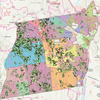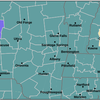Spate of weeks-old nursing-home coronavirus deaths announced
— Photo from the Albany County’s Executive Office
Showing support for Shaker Place Rehabilitation and Nursing Center, these citizens raised money for gift cards for the staff at the county’s nursing home and brought signs to encourage the residents there. Each of them are people who are providers or users of long-term care services who wanted to show their support.
ALBANY COUNTY — Although no county resident has died of COVID-19 in eight days, Albany County Executive Daniel McCoy announced at his Thursday press briefing that the county had been unaware of 11 deaths that occurred at a private nursing home.
That brings the county’s death toll for the coronavirus disease 2019 to 87.
The unnamed nursing home had 11 residents die, nine women and two men, in an 11-day period, from April 29 to May 9. Two were in their seventies, five were in their eighties, and four were in their nineties.
McCoy had said earlier that 65 percent of the county’s COVID-19 deaths were of nursing-home residents. Nursing homes worldwide have been hotspots for outbreaks of the disease and Governor Andrew Cuomo has ordered twice-weekly testing of nursing-home workers as well as testing of residents.
McCoy said on Thursday that the 11 deaths would not have affected the Capital Region’s metrics for Phase 1 reopening nor will it affect the metrics for Phase 2, scheduled for June 3.
Albany County Health Commissioner Elizabeth Whalen stressed that the 11 deaths were not unreported deaths. She said it is difficult to report accurate data in real time.
“The nursing home reported the deaths as they were mandated to do by the state health department so these were not unreported deaths,” said Whalen. “They were just not deaths that the county was made aware of. So now we realize there are systems we need to put in place … so that we can rectify those numbers.”
The county’s health department pulls the cases of people who have tested positive for COVID-19 from the laboratories analyzing the results. “So that is a little bit easier for us,” said Whalen, stressing that it is “an incredibly dynamic process.”
Albany County now has 1,665 confirmed cases of COVID-19, an increase of 21 in the last 24 hours. Five of those 21 were nursing-home workers, McCoy said.
The five-day average for positive tests is now 8 daily.
As of Thursday morning, 615 Albany County residents are under mandatory quarantine – a steep drop of 233 since Wednesday – and seven residents are now under precautionary quarantine.
So far, 4,455 county residents have completed quarantine, with 1,319 of them having tested positive and recovered. That brings the county’s recovery rate up to 79.2 percent.
Currently, 29 county residents are hospitalized, with three in intensive-care units. The hospitalization rate for Albany County stands at 1.74 percent.
Store owners can deny maskless customers
McCoy said he’ll talk at Friday’s briefing about moving to Phase 2 reopening on June 3. The majority of Albany County jobs fall into this category, which includes office settings, retail, and real estate.
Cuomo issued an executive order on Thursday authorizing businesses to deny entry to people who do not wear masks or face-coverings.
“We’re giving the store owners the right to say, ‘If you’re not wearing a mask, you can’t come in.’ That store owner has the right to protect themselves. That store owner has a right to protect the other patrons in that store,” Cuomo said at his Thursday press briefing. “You don’t want to wear a mask, fine. But you don’t then have a right to then go into that store if that store owner doesn’t want you to.”
Free testing for grocery-store workers
Also on Friday, Whalen announced a state initiative for grocery-store workers to be tested, for free, to see if they have COVID-19 antibodies.
The walk-in testing took place on Thursday, and will take place again on Friday and Saturday at the SEFCU Arena on the uptown University at Albany campus from 10 a.m. to 5:30 p.m. Those being tested are to wear face masks.
“We know that grocery-store workers are our front-line workers who are exposed frequently and for prolonged periods of time to members of the public. They are at high risk,” said Whalen.
Getting a positive test result, Whalen said, “may indicate you were exposed and developed antibodies so you likely had the disease in the past.”
She noted that people infected with COVID-19 “aren’t always symptomatic.”



